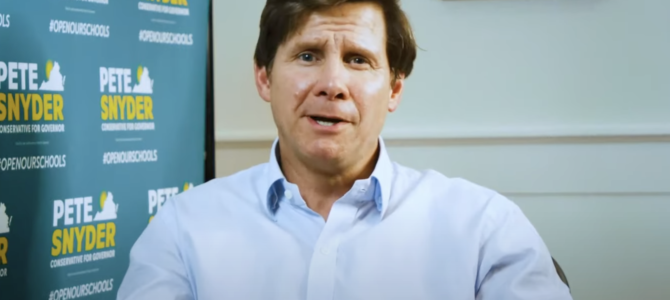In a political hit piece this week, Axios targeted a Republican candidate for governor and his COVID-19 relief organization meant to aid small businesses in Virginia over an alleged mistake on the charity’s statement to the Internal Revenue Service.
In an article published Wednesday, Axios claimed that Pete Snyder, a candidate for governor in Virginia, and his nonprofit Virginia 30 Day Fund, which supported small businesses during government-mandated lockdowns, made “erroneous disclosures to the IRS [which] allowed the group to shield from public view key information about its operators, operations and finances.”
The organization reportedly signaled that it did not raise and did not expect to receive more than $50,000 in donations per year during its first three years by marking a box on a form signed by the group’s treasurer days after Snyder told the Washington Post that the organization began with a $100,000 “seeded” donation from his own family.
While Axios complained that the filing mistake enabled the organization to “shroud key information,” the “granular” filing requirements for nonprofits that rake in more than $50,000 a year do not apply to the fund, which maintains zero overhead, zero contractors, and zero exec salaries. And Snyder mentioned in multiple interviews, the starting expenses for the 30 Day Fund were resourced by his and his wife’s original donation.
That didn’t stop Axios from noting that “the Virginia 30 Day Fund’s mission is central to Snyder’s political brand” and acts as “a calling card for the Republican in a crowded primary in a bellwether off-year race.” Nor did it keep other media outlets from running similar stories bashing the candidate for offering “a completely different [donation] number to the Internal Revenue Service than the amount he is boasting he raised for his COVID-19 relief charity.”
Snyder and his wife Burson first established the fund at the beginning of the COVID-19 crisis with the intent to grant forgivable loans to small businesses in Virginia to “help save as many Virginia jobs as possible” as governors and health experts kept imposing stringent shutdown orders and limitations on businesses around the country.
What began as a small campaign to help their community, however, quickly exploded into a large campaign to offer forgivable and “pay-it-forward” loans “free of red tape.” By day four of the organization’s fundraising efforts, Snyder said the 30 Day Fund received at least 421 application loans and more than $250,000 in donations.
Jim Cheng, chair of the 30 Day Fund, told The Federalist that the fund was formed quickly in the early days of the pandemic, and did not anticipate the sizable success of the project.
“We drafted filings and started fundraising immediately to save small businesses. In fact, we named the organization ’30 Day Fund’ because we thought we would only be in operation for 30 days,” Cheng said. “We had no idea the need would be so great, and we would be serving small businesses in crisis nearly one year later, having raised nearly $45 million to help small businesses stay afloat.”









